The Bhagavad Gita is the ultimate book of knowledge and is duly recognized as such throughout the world. Its wisdom transcends the limits of time and space. I publish daily one message from the book which can be related to our daily life titled: Thought4TheDay
These are widely read and highly appreciated by my connections on LinkedIn, friends on Facebook and followers on twitter totally about 27000 people. As recommended by some friends, I am posting the same here. You may ask questions and/or post your comments which be appreciated. Hope you will find the initiative very rewarding.
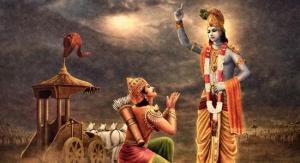
Thought4TheDay (Nov. 25, 2017)
Lord Krishna refers to many gods who are worshiped by people for their different wishes or goals. He further says that the devotee who worship concentrating on what they want achieve the same by the grace of the god they worship. The question of many gods has been creating many doubts in the minds of many. However, these doubts are highly misplaced and betray gross ignorance. As has been repeated in The Bhagavad Gita, Lord Almighty is omnipresent. He is present everywhere and in everyone. Thus His presence empowers gods who are also His creations. In Hindu traditions if an individual wants wealth, he worships Goddess Lakshmi. If he wants power, he would invoke the grace of Goddess Durga. Likewise for the other human desires.
Popular authors and philosophers the world over profess that you can achieve anything that you may strongly desire. In fact the strength of these desires make us take such actions consistently that the desired objectives are achieved. When we invoke the benevolence of celestial forces our efforts are further strengthened. We achieve wealth, power, reputation or knowledge with our sweat and perseverance for which we receive power through our worship.
Thought4TheDay (Nov. 24, 2017)
In a way The Bhagavad Gita represents the dictum, ‘Faith Conquers All’. But if we look around in the world today, we observe that faith and trust have become rare commodities. In fact, we observe that it is not for no reason that the situation is what it is.
Can students have faith in the education system? Can they trust teachers? Can bankers trust the borrowers? Conversely, can entrepreneurs trust that the bankers will fund the valid enterprise purely on merits without some personal interest? People have lost faith in their chosen representatives. Are they to be blamed for that?
Are doctors pursing ‘the noble profession’ and living up to the trust that patients are compelled to have in their ‘nobility’? And what about hospitals? And what about their fat bills?
Please share this post with your friends for greater awareness, should you like it. Thanks.
Month: November 2017
The Bhagavad Gita Talks 35
The Bhagavad Gita is the ultimate book of knowledge and is duly recognized as such throughout the world. Its wisdom transcends the limits of time and space. I publish daily one message from the book which can be related to our daily life titled: Thought4TheDay
These are widely read and highly appreciated by my connections on LinkedIn, friends on Facebook and followers on twitter totally about 27000 people. As recommended by some friends, I am posting the same here. You may ask questions and/or post your comments which be appreciated. Hope you will find the initiative very rewarding.
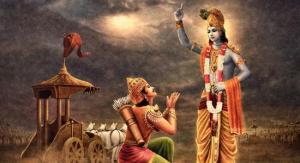
Thought4TheDay (Nov.22, 2017)
Lord Krishna said, “Kuntiputra Arjuna, at the end of human life, whichever aspect is remembered by the dying man, he assumes the same in the next birth. The simple reason for this is that he remained influenced with the particular aspect throughout his life.”
Our future is determined by what we think and what we do from moment to moment throughout the life. Unless we make conscious effort consistently, it’s very difficult to bring in significant change of any kind. Thus, unless consistent efforts are made to bring about any change, it’s hardly possible to achieve the desired results. Your attitude to life, your habits and your actions can change only if these are pursued constantly. There is only one way to achieve success in life and it is the hard way. One has to be self aware at all times and try to bring about the desired change. There is no quick fix. Pursued wholeheartedly and patiently, indeed, anything can be achieved, but one has to be prepared to pay the price of perseverance.
Thought4TheDay (Nov. 21, 2017)
Lord Krishna told Arjuna.
All living beings are born out of grains. Rains are the reason for the growth of grains. ‘Yajna’ brings about rains. And ‘yajna’ is performed by the human beings as a part of their duty. The Vedas are responsible for all efforts towards duty. And the Almighty alone has created the Vedas (holy scriptures). This amply establishes that the omnipotent Almighty is always present amidst the ‘yajnas’.
The progress of society depends on, among other things, the performance of philanthropic people’s activities related to ‘yajna’. These are carried out as devotion to the Lord Almighty for the betterment of all His Creations.
Distribution of a part of an individual’s wealth is a kind of ‘yajna’. The concept of C.S.R. or corporate social responsibility is also ‘yajna’. The real intent behind all NGOs is also the same. It is sad that such funds are sometimes misused for selfish motives or even worse some nefarious activities.
Please share this post with your friends for greater awareness, should you like it. Thanks.
The Bhagavad Gita Talks 34
The Bhagavad Gita is the ultimate book of knowledge and is duly recognized as such throughout the world. Its wisdom transcends the limits of time and space. I publish daily one message from the book which can be related to our daily life titled: Thought4TheDay
These are widely read and highly appreciated by my connections on LinkedIn, friends on Facebook and followers on twitter totally about 27000 people. As recommended by some friends, I am posting the same here. You may ask questions and/or post your comments which be appreciated. Hope you will find the initiative very rewarding.
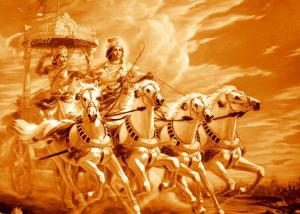 Thought4TheDay (Nov. 20, 2017)
Thought4TheDay (Nov. 20, 2017)
We humans are all individuals. We are different in our response to the circumstances, adverse or favourable; our habits are different and so is our conduct. Even twins raised in the same house, given same education are never identical in their thinking or their actions.
We find some of us are extremely sensitive to the sufferings of other fellow humans, while there are also other people who draw sadistic pleasure when others suffer. Both extremes are undesirable and should be considered as misfits in the society. To be human is commendable. But, at times, such humane people are faced with difficult situations. Their duty involves certain actions which inflict some kind of pain on others.
These highly emotional people neither can perform their duty appropriate nor can they save others from some pain small or big.
The message of The Bhagavad Gita is to perform your duty to the best of your ability under all circumstances.
Thought4TheDay (Nov. 19, 2017)
The dialogue between Arjuna and Lord Krishna, in The Bhagavad Gita, is about life, one’s duty, the role in society, how to live life, how to handle human emotions and various other physical and spiritual aspects of life. When we go through the book, we find that there is no scope to postpone doing anything that needs to be done at a particular moment. The quest for knowledge doesn’t allow us to be unaware of our duty at any given time.
But in real life today, procrastination appears to have inflicted our society to such an extent that it appears like any other normal human habit. In fact, it is not; it’s our worst enemy. It doesn’t allow us to grow. Our personal development suffers a serious setback. But more importantly, our self esteem is diminished. A habitual procrastinator is never able to respect himself/herself.
How would anybody else respect you if you have little or inadequate self respect. The procrastinators suffer in many ways, like:
- Productivity becomes low; allowed work is rarely done in time.
- They develop a negative attitude. They find reasons of failures by blaming others or due to adverse circumstances.
- They are unable to fight their own battles of life.
- Unable to be at peace with themselves.
Please share this post with your friends for greater awareness, should you like it. Thanks.
The Bhagavad Gita Talks 33
The Bhagavad Gita is the ultimate book of knowledge and is duly recognized as such throughout the world. Its wisdom transcends the limits of time and space. I publish daily one message from the book which can be related to our daily life titled: Thought4TheDay
These are widely read and highly appreciated by my connections on LinkedIn, friends on Facebook and followers on twitter totally about 27000 people. As recommended by some friends, I am posting the same here. You may ask questions and/or post your comments which be appreciated. Hope you will find the initiative very rewarding.
 Thought4TheDay (Nov.13, 2017)
Thought4TheDay (Nov.13, 2017)
“The soul is never born nor it ever dies; that is also not true that soul comes into existence only when a person is born. Soul is unborn, it is eternal, everlasting. It doesn’t have a beginning, it doesn’t have an end. The body is slain, but the soul is not.”
When we realize and believe that the soul does not perish; death is only moving out of one body to another, we would not be afraid of death. And, if we keep that in mind always, we would not be doing something against our conscience. The message that the soul is immortal will also help us to dedicate our efforts for the good of humanity. So the benefits are:
- Not afraid of death
- Realization that we are here for a limited time.
- Continuity of life encourages to do out duty honestly.
- Success is achieved when we perform our duty to the best of our ability. We strive to perform better.
- Such performance will bring better results and help us to be at peace
 Thought4TheDay (Nov. 12, 2017)
Thought4TheDay (Nov. 12, 2017)
“I am the gamble of the cheats. I am the clout of the influential ones. I am the victory of the victors. I am the decision of the decisive. And, I am the ‘satvik tatava of the noble persons.”
The message that the above words of Lord Krishna give to the readers of The Bhagavad Gita is that whatever you may do, utilise the very best in you. Apply your mind. Thinking ability is the great powerhouse that enables an individual to scale any heights. Resources that are given to us to be utilised in all our activities, at all times. It’s only when we leverage our strengths that we achieve the best results. Modern management gurus are just repeating the wisdom of our- The Bhagavad Gita, the greatest book of knowledge.
Read The Bhagavad Gita. Gain knowledge. Spread knowledge. Picture shows the most notable propagator Swami Vivekananda with his associates.
Please share this post with your friends for greater awareness, should you like it. Thanks.
Voice Modulation
 Voice modulation is necessary for making your speech interesting. If someone is speaking without modulating his/her voice, they will sound like people who are not concerned whither you listen to them or not Voice modulation makes your listeners listen to you.
Voice modulation is necessary for making your speech interesting. If someone is speaking without modulating his/her voice, they will sound like people who are not concerned whither you listen to them or not Voice modulation makes your listeners listen to you.
What is voice modulation? And how do we imbibe voice modulation techniques in our personality? These and various other aspects of voice modulation form an integral part of our unique voice modulation and public speaking course.
Definition
First of all let us understand the meaning of Voice modulation. The dictionary meaning of the word ‘modulation’ when referred to voice implies, regulating the voice as per requirement of your speech. Thus, you must bring in change in pace, pause and pitch while speaking. Without modulation, your speech will be flat and monotonous. Further, you must also change the emphasis on the keyword and the tone to improve the efficacy of your speech.
 Objectives of Voice Modulation:
Objectives of Voice Modulation:
The following 3 objectives are Critical. 1) To enable the listener to understand you fully. 2) To enable you to express your ideas effectively. 3) To ensure that you are not repetitive or verbose. There would be many more benefits of voice modulation, but these 3 must be remembered so that you will always try to bring about a well modulated speech. During one on one conversation as well as speaking to a group or even speaking in public.
 Techniques of voice modulation:
Techniques of voice modulation:
Speech is a matter of habit. Habits change very hard. Therefore, unless we use highly effective techniques of voice modulation, the results will be for from satisfactory. Through various innovative modulation exercises we train our students to learn these techniques. Repetitive process enable the trainees to imbibe voice modulation practice in their day to day speech.
Who should practice Voice Modulation?
The one word answer to the question is: ‘Everybody’. Because everyone wants to express himself/herself clearly. Everyone wants that people should be impressed by their well modulated speech. Because everybody wants views. Thus voice modulation is vital for public speakers, those who want to make presentations and all those who want to succeed in influencing people.
Thanks for reading.
The Bhagavad Gita Talks 32
The Bhagavad Gita is the ultimate book of knowledge and is duly recognized as such throughout the world. Its wisdom transcends the limits of time and space. I publish daily one message from the book which can be related to our daily life titled: Thought4TheDay
These are widely read and highly appreciated by my connections on LinkedIn, friends on Facebook and followers on twitter totally about 27000 people. As recommended by some friends, I am posting the same here. You may ask questions and/or post your comments which be appreciated. Hope you will find the initiative very rewarding.
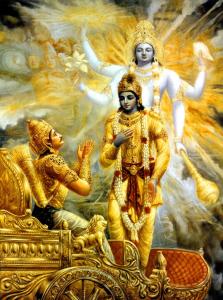
Thought4TheDay (Nov. 11, 2017)
Two beautiful similes describe how knowingly or foolishly the humans who fail to realise what they rush towards their end and losing their own identity. These are:
- ” Just like the water of a river naturally flows towards the sea where it merges, so do warriors of this mortal world are rushing into your flaming mouths.” said Arjuna, being amazed at looking at the Virat Swaroop of Lord Krishna. He continued:
- ” As moths rush with great speed speed into the blazing fire for extinction out of their folly, even so all these people are seen entering rapidly into your mouths to meet their end, their doom.”
Similarly humans who are intoxicated with their success, particularly those who exploit others have to come to an end which they little realise.
Thought4TheDay (Nov. 8, 2017)
Arjuna is bewildered at seeing the ‘divine form’ of Lord Krishna. He says: ” Seeing Your frightful faces on account of teeth flaring like fire at the time of universal destruction. I am utterly bewildered and find myself totally confused. Be kind to me.
All those sons of Dhrtarastra with hosts of kings are entering You. Bhishma, Drona and Karna, with the principal warriors on our side as well, are rushing headlong into Your fearful mouths looking all the more terrible on account of their teeth: some are seen stuck up in the gaps between Your teeth with their heads crushed.” The universal form of Lord Krishna frightens Arjuna who requests Him to return to His human form.
Please share this post with your friends for greater awareness, should you like it. Thanks.
The Bhagavad Gita Talks 31
The Bhagavad Gita is the ultimate book of knowledge and is duly recognized as such throughout the world. Its wisdom transcends the limits of time and space. I publish daily one message from the book which can be related to our daily life titled: Thought4TheDay
These are widely read and highly appreciated by my connections on LinkedIn, friends on Facebook and followers on twitter totally about 27000 people. As recommended by some friends, I am posting the same here. You may ask questions and/or post your comments which be appreciated. Hope you will find the initiative very rewarding.
Thought4TheDay (Nov.7, 2017)
 “Arjuna, he who looks on all others as his own self (as I am present in all souls) and also looks upon joy and sorrow with a similar eye (wherever there is joy, sorrow will also be there); such a yogi is considered as highest of all.”
“Arjuna, he who looks on all others as his own self (as I am present in all souls) and also looks upon joy and sorrow with a similar eye (wherever there is joy, sorrow will also be there); such a yogi is considered as highest of all.”
No doubt, it is difficult. Human emotions are difficult to be controlled. But what happens when we let them loose. Do these change the situations for the better? Do we stand to gain in any way? No way. Another pertinent question to be considered is: do all people react in the same way? If not, then certainly there is scope for improvement. Moreover, The Bhagavad Gita shows us the way how to follow the middle path. That middle path is the path of human progress. That is the path which enables us to be at peace with ourselves. Read The Bhagavad Gita. Live life significantly. And, above all enhance your self esteem.
Thought4TheDay (Nov. 6, 2017)
 It has been observed that whatever we do against our conscience produces negative results. However when it happens in what form it happens, remains unknown to us. So, we may continue to do things that our conscience doesn’t permit.
It has been observed that whatever we do against our conscience produces negative results. However when it happens in what form it happens, remains unknown to us. So, we may continue to do things that our conscience doesn’t permit.
Life is an account book. Our positive actions which are carried out for the good of society are our credits. Similarly our undesirable actions which are against our conscience are added to our debits. Thus both the good and the bad activities become a part of our balance sheet of life.
However, some events are beyond comprehension. For example, if a person is driving his/her car on a highway within speed limits respecting all the driving rules yet they lose their live in a fatal accident. Someone else’s fault causes the fatal accident and yet the innocent person loses life. It appears that it has happened due to some misdeeds of the previous birth. Indeed, as explained in The Bhagavad Gita we all undergo the cycle of life and birth till our good deeds result in merging with the God almighty.
Please share this post with your friends for greater awareness, should you like it. Thanks.
The Bhagavad Gita Talks 30
The Bhagavad Gita is the ultimate book of knowledge and is duly recognized as such throughout the world. Its wisdom transcends the limits of time and space. I publish daily one message from the book which can be related to our daily life titled: Thought4TheDay
These are widely read and highly appreciated by my connections on LinkedIn, friends on Facebook and followers on twitter totally about 27000 people. As recommended by some friends, I am posting the same here. You may ask questions and/or post your comments which be appreciated. Hope you will find the initiative very rewarding.
Thought4TheDay (Nov. 5, 2017)
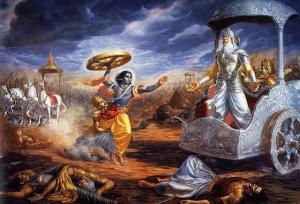 “The four orders of society (viz. the Brahmana, the Kshatriya, the Vaishya and the Shudra) were created by Me classifying them according to the mode of Prakriti predominant in each and assigning corresponding duties to them; yet the creator Me, the Almighty remain a non-doer.” This is how Krishna explained the order of the society to Arjuna.
“The four orders of society (viz. the Brahmana, the Kshatriya, the Vaishya and the Shudra) were created by Me classifying them according to the mode of Prakriti predominant in each and assigning corresponding duties to them; yet the creator Me, the Almighty remain a non-doer.” This is how Krishna explained the order of the society to Arjuna.
Indeed, the society needs all these four classes of people for proper functioning of the civil order. Unfortunately, over a period of time lower class/classes were looked down upon and our society was inflicted with the malady of untouchability. In fact, everything in this world keeps on changing. Any necessary principle when misdirected due to any reason can take form of an abominable disease, and so did this one in our country.
Noted British novelist named these four categories of people as Alpha, Beta, Gamma and Delta in his famous book, ‘The Brave New World’. In a bid to create an ideal society, humans are ‘manufactured’ in factories and conditioned as per requirement which again is shown as a curse to humanity.
We need to respect all human beings as they are, and that’s the message of The Bhagavad Gita.
Thought4TheDay (Nov. 4, 2017)
 While explaining the qualities of a stable minded person, Krishna emphasises one quality which, I think, has assumed more importance today than at any other time due to so many means of distractions and that is:
While explaining the qualities of a stable minded person, Krishna emphasises one quality which, I think, has assumed more importance today than at any other time due to so many means of distractions and that is:
‘Vayarth ki cheshta ka abhaav’ or no indulgence in futile efforts; that’s another extremely important lesson that we learn by the study of The Bhagavad Gita. The meaning or the significance of life and how to live it in the book of knowledge leaves no scope for engaging oneself into wasteful activities. We all know it well. We all realise it even better. Yet if we scrutinise any of our day, we may find that some of our time does get wasted with the avoidable and unnecessary activities. While it’s important to make a ‘to do’ list everyday, it is even more important to make ‘not to do’ a list also. And, everyday!
Read The Bhagavad Gita. Know the significance of your live. Be happy and spread happiness.
Please share this post with your friends for greater awareness, should you like it. Thanks.
The Bhagavad Gita Talks 29
The Bhagavad Gita is the ultimate book of knowledge and is duly recognized as such throughout the world. Its wisdom transcends the limits of time and space. I publish daily one message from the book which can be related to our daily life titled: Thought4TheDay
These are widely read and highly appreciated by my connections on LinkedIn, friends on Facebook and followers on twitter totally about 27000 people. As recommended by some friends, I am posting the same here. You may ask questions and/or post your comments which be appreciated. Hope you will find the initiative very rewarding.
Thought4TheDay (Nov. 3, 2017)
 We, humans suffer from many inherent fears. Our education and upbringing help us to conquer some, most or all these fears. But do they? Or at times, do they add to these fears? Unfounded as these could be, at times, we live with them throughout our lives. ‘Loag Kaya Kahen ge?’ The question prevents us from doing many things that we may.
We, humans suffer from many inherent fears. Our education and upbringing help us to conquer some, most or all these fears. But do they? Or at times, do they add to these fears? Unfounded as these could be, at times, we live with them throughout our lives. ‘Loag Kaya Kahen ge?’ The question prevents us from doing many things that we may.
These form the root cause of all negativity in our lives. Reading The Bhagavad Gita gives us one strong message. The message is that fear of criticism or failure should never deter us from performance of our duty.
At the battlefield, Arjuna tells Krishna that he would not fight and be responsible for the killing of his close relatives. But he also tells him that he does not know whether he would win or face a defeat. Uncertainty breeds fear of failure. Fear discourages any new enterprise. There is nothing worthwhile to achieve without any risk. Taking no risk is the biggest risk of life.
Thought 4TheDay (Nov. 2, 2017)
 It’s a myth that The Bhagavad Gita doesn’t encourage one to have goals. Unless you have specific, measurable and clear goals, how will you know what you must do at any particular time?
It’s a myth that The Bhagavad Gita doesn’t encourage one to have goals. Unless you have specific, measurable and clear goals, how will you know what you must do at any particular time?
Your goals determine the direction of your activities. These will help specifying your desired actions. Strategy to achieve your goals will enable you to make decisions about your actions. Movement towards your targets for achieving these goals is, in fact, journey of your life.
Your employer, or if you are a business owner, the needs of your business define your responsibilities. So also, your family friends and other connections. They all play their respective roles during the course of your journey.
Your conduct, interaction with others, hard work and ability to persevere cumulatively determine your rewards.
Please share this post with your friends for greater awareness, should you like it. Thanks.
The Bhagavad Gita Talks 28
The Bhagavad Gita is the ultimate book of knowledge and is duly recognized as such throughout the world. Its wisdom transcends the limits of time and space. I publish daily one message from the book which can be related to our daily life titled: Thought4TheDay
These are widely read and highly appreciated by my connections on LinkedIn, friends on Facebook and followers on twitter totally about 27000 people. As recommended by some friends, I am posting the same here. You may ask questions and/or post your comments which be appreciated. Hope you will find the initiative very rewarding.
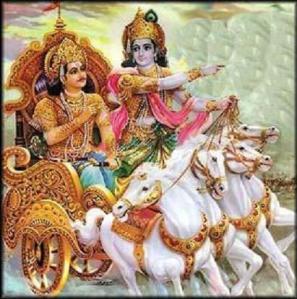
Thought4TheDay (Nov.1, 2017)
According to The Bhagavad Gita, nothing is more important in life than performing one’s duty wholeheartedly and to the best of your ability. But you cannot do this unless you keep an open mind. What does it mean? It means that you must assume nothing. No negative assumptions in any case. Your positive attitude will give you confidence of your success. But that too can fail. Yet, you need not get hurt, because that is life.
Your understanding of life’s various ways help you to have no expectations and yet do your best, always. As they say, excellence is a habit. Such are the habits of great thinkers, scientists and other seekers.
Thought4TheDay (30.10.2017)
The person who neither eats less,nor eats more; neither sleeps less, nor sleeps more; neither speaks less, nor speaks more; neither becomes too happy, nor becomes too sad; that person has understood how to live life. He has realised that day is followed by night which again is followed by day. The difference is that whereas day and night, summer and winter follow is a destined cycle, of an individual does not display a set cycle of events. They do change but they change in an irregular manner. Unexpected situations do arise and furthermore these may bring about totally unexpected results, sometimes weird. But that is life. And the wise truly understands this.
He, therefore, doesn’t gets attached to the results. Nevertheless, he keeps on performing his duty to the best of his ability.
Please share this post with your friends for greater awareness, should you like it. Thanks.